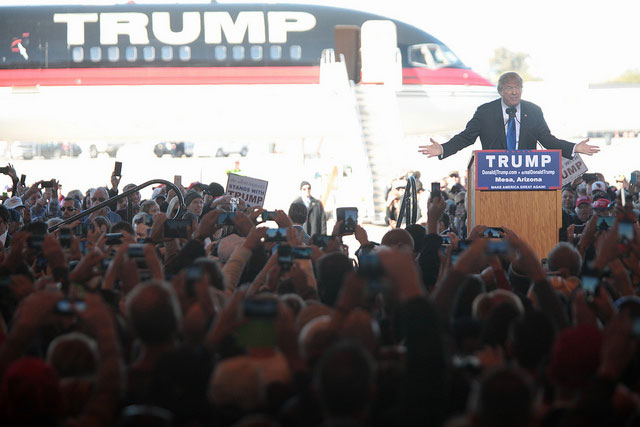
Corruption in high places is hardly a new story in this country, yet Donald Trump seems determined to take corruption to a new level. He of course is setting the path himself, refusing to follow a longstanding precedent whereby presidents put their assets in a blind trust so that they are not in a position to profit personally from their policies. Trump has done the opposite, evidenced by including his business partners (i.e. his kids) in important meetings with foreign officials.
Not surprisingly, the lack of concern for ethics in his own dealings has spilled over into his picks for top administration positions. While his cabinet is filled with the incredibly rich who, thanks to Trump’s proposed tax breaks, will be newly incentivized to steal, there are two individuals who stand out: Steven Mnuchin, Trump’s pick for Treasury secretary, and Andrew Puzder, Trump’s choice for Labor secretary.
These two nominees sat at the top of major corporations that had large scale violations of the law. They may not have known of the illegalities, but frankly as CEOs, they have the responsibility to ensure that their companies are following the law. Furthermore, if both are approved, they will be in a position where they are responsible for enforcing the laws that their own companies violated.
In Mnuchin’s case, OneWest Bank, which he cofounded and ran, had a practice of rushing evictions to foreclose on underwater homeowners following the collapse of the housing bubble. An article in The Intercept by David Dayen reports on a memo from the California attorney general’s office detailing the banks abuses. The article details a variety of dubious and illegal practices the bank pursued to dispossess homeowners.
In the former category, it mentions an instance where OneWest Bank pursued a foreclosure over a 27 cent payment shortfall. In the latter case, the memo documents backdated mortgage contracts. In several cases, the date listed was prior to date when OneWest Bank came into existence. This sort of backdating would be a clear case of fraud. The attorney general’s staff recommended a civil case against the bank, which Attorney General Kamala Harris (now Sen. Kamala Harris) chose not to pursue. As Treasury secretary, Mnuchin will be overseeing a department that has substantial supervisory responsibilities over the banking system.
Puzder’s run-in with the law is perhaps somewhat less egregious than Mnunchin’s, but also involves violating laws that he will be expected to enforce if approved for his position. Pudzer runs CKE Restaurants, which is the parent company for both Hardee’s and Carl’s Jr. Burger chain. According to the Huffington Post, Hardee’s was forced to pay $58,000 in back pay to workers who were not paid overtime wages that were owed. There were also a number of instances in which franchisees of the companies were required to give back pay to workers who had been denied overtime they were owed.
One of the responsibilities of the Labor Department is enforcing wage and hour laws, which includes making sure that employers make required payments. While it is usually good to have a person as Labor secretary who has familiarity with these laws, being the target of an enforcement action is not the best sort of familiarity. It raises the obvious question of whether Puzder is likely to take seriously his responsibilities to protect workers or whether he will have more sympathy with the employers seeking to evade the law, possibly including his former colleagues.
These are the sort of conflicts of interest and questionable practices that would ordinarily be drawing considerable attention in the media as Donald Trump prepares for his inauguration. Unfortunately they have been largely ignored as issues like Republican plans to repeal the Affordable Care Act and gutting the Office of Congressional Ethics have occupied center stage. While these other issues are certainly important, they should not distract enough attention to allow Trump to install cabinet members whose conflicts of interest and past practices make them unqualified for their positions.
But the conflicts and questionable practices by his cabinet picks pale in comparison with Trump’s plan to maintain his business empire even as he assumes the presidency. It speaks to the incredible degradation of ethical standards that this could be tolerated. Every president in the last half century, of both parties, has put their assets in a blind trust upon assuming the office.
If Donald Trump is not prepared to divest his empire, then he shouldn’t have run for president. It is that simple. (It’s also not hard for Trump to avoid conflicts of interests, even with his far-flung business interests.) If Congress allows Trump as president to flagrantly violate longstanding ethical standards, then we certainly can’t expect anything better from cabinet nominees like Mnuchin and Puzder.
Join us in defending the truth before it’s too late
The future of independent journalism is uncertain, and the consequences of losing it are too grave to ignore. To ensure Truthout remains safe, strong, and free, we need to raise $31,000 in the next 48 hours. Every dollar raised goes directly toward the costs of producing news you can trust.
Please give what you can — because by supporting us with a tax-deductible donation, you’re not just preserving a source of news, you’re helping to safeguard what’s left of our democracy.